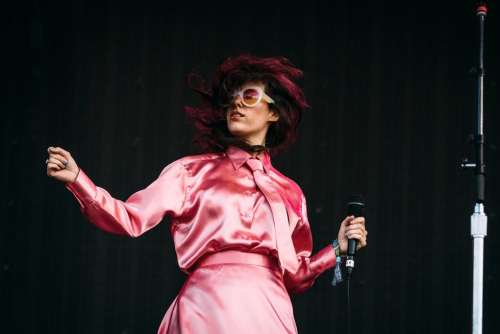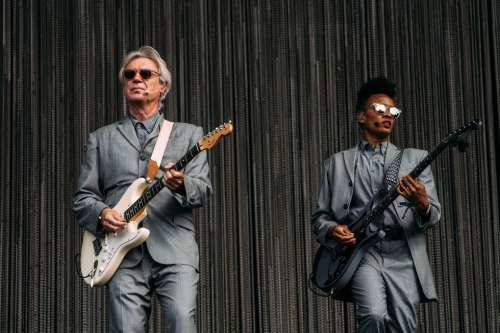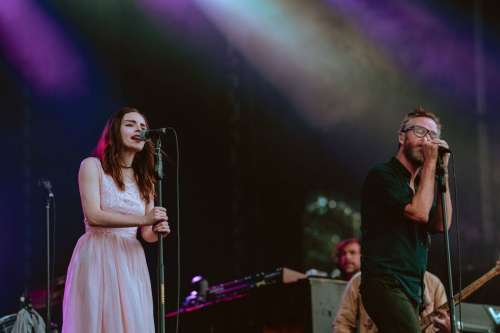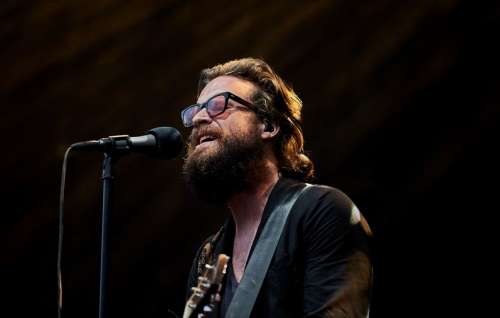2018 ACL Music Festival Recap – Friday, Weekend Two
Via Pop Matters
By Brice Ezell
The first weekend of the annual Austin City Limits music festival, hosted in Zilker Park just south of downtown, ended up being a much bigger escape for attendees than it might normally have been. With Supreme Court nominee Brett Kavanaugh getting confirmed on the Saturday of Weekend One, despite heavy opposition from numerous political and social organizations, the air was rife with anger, frustration, and sorrow, all of which were not lost on the artists performing across the festival's eight stages. The National dedicated their political rocker "Mr. November," which the band once dedicated to Barack Obama during the 2008 election, to local favorite Beto O'Rourke, currently running to unseat Ted Cruz in the Senate. Lauren Mayberry, frontwoman of CHVRCHES, prodded her audience to shout "FUCK!" as a riposte to Kavanaugh's confirmation.
The electoral mood in Austin at the moment is expectant. Texas continues to veer closer to becoming a true "purple" state, rather than the red state it has been for many decades now. Still, pollsters and prognosticators indicate that a Beto win in the senate race is unlikely. One can't walk a city block in Austin without encountering a litany of Beto signs, but Austin is just one city, and Texas, well, it's where "everything is bigger". As I walked into ACL at the start of Weekend Two, I wondered if the glum air of political frustration would carry over into the second weekend. The Kavanaugh confirmation is over, but the anger of local Austinites remained palpable. Would ACL continue to be equal parts cathartic outlet and cry for resistance?

NATALIE PRASS / Photo: Greg Noire / Courtesy of the Austin City Limits Music Festival
I hear no such chat amongst the festivalgoers as I made my way around the festival grounds before Natalie Prass' 12:00 pm set at the American Express stage, the main stage of the festival. Of course, the grueling cruelty of the confirmation hearings lay heavily upon the nation, particularly women, so it makes sense that folks wouldn't be interested in venting about what occurred just a week ago. Yet it doesn't take long for me to see the indications that current politics continue to occupy the minds of festivalgoers and those running the festival itself. Beto stickers, hats, and shirts are common vestments for attendees. Hand fans passed out at the front entrance of the festival sport the (necessary) imperative, "Just fucking vote." It would be foolish to characterize ACL as a political rally in the guise of a festival, no matter how many of the artists performing here this weekend tell their audiences to vote and resist. But as much as ACL provides a respite from the descent into madness and disenfranchisement that is US politics, one also cannot say that the festival is a total getaway from politics or the concerns of the outside world. In fact, the best performance of Day One concludes with a powerful rally call to justice.
The first performer on my docket for Weekend Two is Natalie Prass. After putting out a promising self-titled debut in 2015, Prass this year released the astounding The Future and the Past, still one of 2018's finest musical recordings. It isn't long into her 12 PM set, one of the earliest at ACL, that it becomes clear just how much of a main stage artist she really is. With her set being an early one, there's a predictably small audience – despite ACL's commitment to finding excellent artists to place in the early afternoon sets, many attendees don't show up until around 3 or 4 PM, right when the "big" artists start to take the stage. Prass deserves a full crowd, but the size of her audience doesn't hinder what ends up being a magnetic performance. With the help of her outstanding band, all of them white men sporting all-blue outfits to contrast with Prass' pink satin dress and tie, Prass does justice to the core tracks of The Future and the Past. She dips into her first record some, including a fantastic rendition of the single "Bird of Prey," but with an economical 50 minutes to work with, Prass devotes her time to her new tunes.
Melding together classic soul, funk, and rock music, Prass evokes a different time in music history but does so without committing to a retroism that would render her music nothing more than tributes to a bygone era. All the markers of a classic rock concert are here: sharp guitar riffs, propulsive beats, and solo sections for each instrumentalist. (Prass alternates between guitar, keyboard, and just holding a microphone.) What makes Prass' music so brilliant, particularly The Future and the Past, is that it doesn't sound like it's trying to be anything other than it is. As Prass dances and sings her way through her set, one can hear a range of influences, and by the end, it's easy to tell that Prass probably has an incredible record collection. But all of those influences, rather than singing more loudly than Prass, are at the service of her own songwriting. It takes real charm and musicianship to span, as Prass would put it, the future and the past, and the all-too-brief 50 minutes of her performance on the main stage are a testament to her ability to do just that.
Following Prass' set, I decided to peruse the festival grounds to get a sense of what – if anything at all – is different about the festival from my time here two years ago. The festival, as it has for many years now, excels at the rudiments that make an experience like this easy to navigate. Numerous shaded spaces are provided for people to eat and get a respite from the heat (though starting at 3:30 PM, a light grey overcast blankets the sky, mercifully shielding everyone from the still-hot-in-October-and-even-November Austin climate). The placement of the stages prioritizes space (especially as the crowds balloon later in the day) and the avoidance of sound bleeding. Even in the backmost parts of the crowd, I rarely hear the sound of other sets interfering with whatever I happen to be watching.
As is expected with a festival of this size, the corporate influence looms large, from the names of the festival stages all the way to the #branded signs where people routinely stop and take photos. ACL emphasizes locality enough to counterbalance the big names like American Express and Honda; food options include local taco favorites Torchy's and Tacodeli, and quality BBQ from Micklethwaite and the Salt Lick. It's near impossible to imagine how any festival of this caliber could be propped up without major corporate support, but still, there's something about the way in which festivals like these require attendees to repeat brand names to give direction and map out festival strategy: "Oh, we gotta go to the Honda stage," "See you at the American Express stage at 5:20." This complaint is pointless, and I know it every time it crosses my mind, but hey, you gotta dream, right?
After shaking off my cynicism about capitalism, I return to the matter at hand: music. Having wandered around the music festival – the only pause I will get to survey the land in what will otherwise be a weekend of wall-to-wall music – I go to the Miller Lite stage, where Canadian indie darlings Alvvays have just started their performance. The group I'm with – including some friends and my fiancé – arrive just as the band begins the song "Atop a Cake", which features a guitar part which is a near dead-ringer for Bruce Springsteen's "Born to Run", the song I was sure it was as we first neared the stage. Performing during the hottest part of the day, Alvvays breezes its way through a 12-song set, which aptly demonstrates the band's tuneful and catchy songwriting. The light and inviting vocals of frontwoman Molly Rankin help to elevate what is frequently a pleasant but indistinct set of songs.

DAVID BYRNE / Photo: Greg Noire / Courtesy of the Austin City Limits Music Festival
The kind of indie pop in which Alvvays excels – also the kind that makes up a considerable amount of ACL's lineup in a given year – could not be more different from the experience I have immediately following that band's set. Almost directly across from the Miller Lite stage, the main stage is minimally set for David Byrne's performance. Strings of beads form three walls around the stage (one long one on the back, and two on the side); a single wooden school desk occupies the center of the otherwise bare stage. When Byrne, clad in an all-grey suit, takes to the stage, he holds a plastic model of the human brain, which he uses to give the song/TED Talk parody "Here", a number off of his latest LP American Utopia. Anyone familiar with Byrne's career and in particular his background in the New York art scene of the '70s undoubtedly finds this unsurprising; he's never been a typical rock star, not the kind of person you'd expect to perform on the main stage of a festival whose big draws in recent years have been LCD Soundsystem and, this year, Travis Scott. (Though LCD does a damn fine Talking Heads impression, as anyone who's heard Sound of Silver knows.) But what unfolds over the next hour goes far beyond Byrne's characteristic oddity, and becomes what might just be the best festival performance I have ever seen.
A troupe of outstanding musicians and dancers, all sporting grey suits, joins Byrne with the second song of the set, "Lazy". The ensemble faces no small task, as far as festival performances go. In addition to having to perform an hour-long set in full suits, despite the bare and humid fact of Austin weather, many of the musicians sport heavy instruments that are attached to their bodies by rigs which undoubtedly crank up the sweat factor a considerable amount. The keyboard player and numerous drummers of the band no doubt got their cardio in for the day. (One dancer's shirt transforms from light grey to dark grey halfway through the set.) The sheer talent and energy of the performers onstage, however, indicates that even scorching weather wouldn't have stopped the brilliance onstage.

DAVID BYRNE / Photo: Greg Noire / Courtesy of the Austin City Limits Music Festival
Byrne and his band perform a smattering of Talking Heads classics, including "This Must Be the Place (Naïve Melody)", "Once in a Lifetime", and "Burning Down the House". Some of the original choreography for these songs, including the erratic dance moves of "Once in a Lifetime", are brought to the stage brilliantly. Byrne's is arguably a more danceable set than even some of the top-tier electronic artists I've seen at this festival. (Justice, who headlines on Saturday, has some steep competition.) Halfway through the performance, my fiancé – riding the high off of "This Must Be the Place", her favorite song in the world – remarks to me that Byrne looks like he's continually surprised by his own music, even though the 13-song set consists largely of "the hits", the kind of thing one would expect a legacy artist to play at a major music festival. These songs are "the same as they ever were", and yet they weren't.
The conclusion of Byrne's show comes with a surprise. (Well, a surprise to those like me who knew little about Byrne's tour for American Utopia, where the song that I'm about to describe has been the second encore.) He announces he and the band are performing a song by fellow ACL performer Janelle Monáe, "Hell You Talmbout". The song is Monáe's musical protest against police brutality and violence against black Americans: the verses list off names of black people killed by police and race-based violence, with each shout of a name followed up by the line, "Say [their] name!" Freddie Gray, Botham Jean, Sandra Bland, and Michael Brown all get name-checked. Byrne, clearly aware of his subject position, lets the artists of color in his band (one of the most diverse on the ACL stages this weekend) take center stage and lead the call-and-response that drives Monáe's powerful call for justice and remembrance. As the final drum hit thuds into an echo that rings throughout the field out front of the main stage, I get chills in my spine. I see several people around me wiping away tears. Having already reminded the ACL audience about the importance of voting in the middle of the set, Byrne's last words to his enraptured crowd: "November 6th".

THE NATIONAL / Photo: Roger Ho / Courtesy of the Austin City Limits Music Festival
I want to get a good spot for the National's 5:30 PM performance, which means battling through an increasingly vast crowd at the main stage, where many have already begun to set up camp for Paul McCartney's headlining performance later in the evening. But an hour separates the end of Byrne's show and the National following his lead at the main stage, and several other excellent artists are queuing up at ACL's other stages.
In the brief time between Byrne and the National I get only brief snapshots of the other shows going on, but what I do catch speaks to the caliber of talent ACL consistently attracts. Lily Allen's reputation for charm and infectious energy proves all too true for her gig at the Miller Lite stage. The stellar UK soul outfit Jungle, a favorite of this publication, bring serious groove and swagger over at the Barton Springs stage – a friend of mine who was able to stay through the second half of the set, which I regrettably had to miss, said he "lost his mind with joy", a sentiment that's no exaggeration for a band as stylistically innovative as Jungle.
Moments like these, where I experience only brief windows of a given set, are a reminder that while the preponderance of excellent music at ACL (or any other such festival) is the reason to go, it's also inevitably disappointing that no one can see everything they want to. The paradox of choice inevitably rears its ugly head. Attending a festival means accepting the limitations of the human body, and do that I must, as I head to the main stage to see the National.

LILY ALLEN / Photo: Roger Ho / Courtesy of the Austin City Limits Music Festival
On the one hand, I find that much of the National's music consists of, to quote Jamie Peck, "well-constructed and slightly boring" songs, particularly on the two records that garnered the National its biggest public reception, High Violet and Trouble Will Find Me. But as I wrote in my review of the National's newest LP Sleep Well Beast for this very publication, the band has brought its songwriting back to the days of Alligator and Boxer, both classics of the indie rock genre. And not only does the greatness of Sleep Well Beast hold true on the stage, but even some of the "well-constructed and slightly boring" tunes of the National's past, like "Don't Swallow the Cap", gain a whole new life in a concert setting. For a group that frequently hovers in the mid-tempo range, at times to the point of mumbly introspection, the National actually, well, rocks.
Sleep Well Beast cuts like "Day I Die" and "The System Only Dreams in Total Darkness" are tailor-made for a stage like this one, which is an odd thing for me to write given that up until today I couldn't have imagined wanting to see an outfit like the National in such a large space, given that its music invites intimacy more often than not. But when frontman Matt Berninger comes running down to the crowd level on "Day I Die", and guitarist Aaron Dessner rips through the guitar solo of "System", it's clear that the guys of the National have earned their status as rock stars – it's not simply just a name. The moody "Guilty Party" is elevated not just by a strong crescendo, but also by the presence of CHVRCHES frontwoman Lauren Mayberry, an artist who is becoming something of a frequent collaborator. (At the Treasure Island festival in San Francisco a few years back, Berninger brought Mayberry onstage for "I Need My Girl", and CHVRCHES' 2018 LP Love is Dead features Berninger on the track "My Enemy".)
An interruption due to a medical issue in the audience (which the band responds to, quite classily, by stopping their set cold in its tracks and killing the stage lights to make it easier on the medics) doesn't hinder a raucous finale, including the cathartic, screamed chorus of "Mr. November": "I won't fuck us over! I'm Mr. November!" In a time where our leading politicians embody "fucking people over", I and the people around me sure hope that one day soon there is one such "November" politician – male, female, gender non-conforming – who can point to a better future.

THE NATIONAL and CHVRCHES frontwoman Lauren Mayberry / Photo: Roger Ho / Courtesy of the Austin City Limits Music Festival
As the National leaves the stage – and, as it turns out, touring for "a long time", as Dessner put it, having toured for over a year in support of Sleep Well Beast – the crowd for McCartney continues to build. It appears that if I leave the main stage crowd, I might not be able to get back in. I risk it, for the last artist that even just a year ago that I thought I would risk a bad view for Father John Misty. Having heard what he accomplished with the Fleet Foxes, and some promising selections from his solo career, I get what people like about him. I don't know if it's the getting into tabloid-level stupid squabbles with people like Ryan Adams or headlines like "Father John Misty Makes a Meme About His Album Leaking" (nope, didn't make that up), but songwriting talent couldn't cut through insufferability for me with Father John Misty – that is, to my somewhat chagrined surprise, until I heard God's Favorite Customer, his 2018 album.
Slight biographical note: I am a sucker for a singer/songwriter who plays the piano. I have strong opinions about Billy Joel and Warren Zevon. (Yes, I know those two are, respectively, the American cheese and Stilton of the piano singer-songwriter worlds; I could talk about both for way longer than should be legal.) So when a barroom, sad-sack collection of tunes like God's Favorite Customer comes along, I can't help but take notice. And damn it, insufferability aside, Father John Misty is a superb performer, and with the help of a robust backing band – including a string section – he gives the McCartney-expectant ACL crowds a delightful show, one which even elevates the dingy sadness of God's Favorite Customer into near-stadium rock pathos. The Barton Springs stage feels too small for a performance this grandiose.
After taking in a little less than half of Misty's performance, I must return to the main stage, where the crowd is now at a density greater than any of the three headliners I saw two years ago – for artists including Radiohead, Kendrick Lamar, and the then-recently returned LCD Soundsystem. One can hardly be shocked that one of the architects of modern pop music, as we know it, has summoned a crowd so wide and deep, so young and old. This fact is easily forgotten, however, when one must elbow and nudge his way through a crowd of people not paying attention to the throngs of festivalgoers hoping for a better view than "can only look at the screens on either side of the stage". The view my friends and I end up with is barely better than that. But when McCartney comes out in full view of the crowd, signature violin bass slung over his shoulder, could anyone care about whatever view they had?

FATHER JOHN MISTY / Photo: Grant Hodgeon / Courtesy of the Austin City Limits Music Festival
Having an opinion about Paul McCartney is like having an opinion about breathing air, or the necessity of water. His greatness just is. What is there to say apart from what legions of fans, critics, and historians have already repeated ad infinitum? His stamp on pop and rock history is unmistakable, and many his oldest tunes still hold up as exemplary songwriting. Talking about his legacy – to say nothing of the Beatles as a whole – is passé, and so to avoid any cliché or exaggeration, I will simply report what happened at the end of the first night of Weekend Two. McCartney played songs from every corner of his catalogue, from the Beatles to Wings to his new solo disc, released just this year, entitled Egypt Station. The crowd is enraptured from start to finish. People who have clearly followed McCartney since the Beatles days are dancing. Young people who maybe only know McCartney superficially are dancing. McCartney's voice isn't what it once was; he boldly doesn't change the key signature of "Maybe I'm Amazed", one of his finest achievements, and it shows.
But this two hour and 15-minute performance isn't about technical excellence – though there are plenty of fine guitar solos for the crowd to enjoy. No, this set is about being in the presence of greatness, and it's to McCartney's credit that he never once gives an indication that he's just going through the numbers, or just here to play the hits. He actually looks like he's having fun. And to be having fun with one of the legends of contemporary music in the same, big, wide-sky space: what more could one ask from an opening night of a festival?